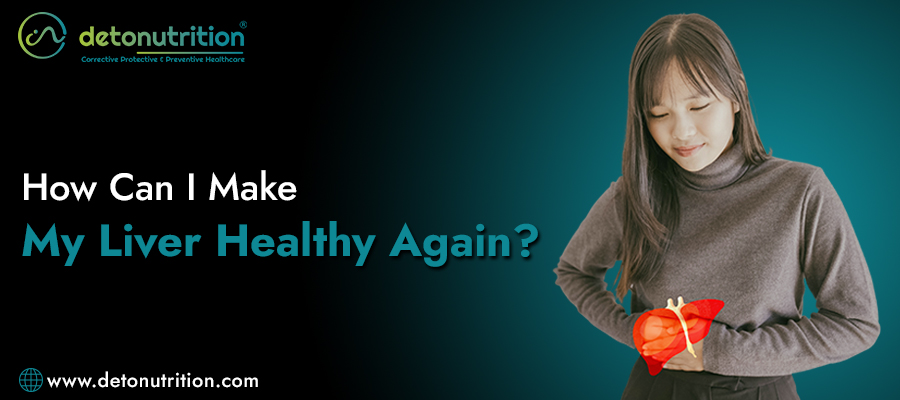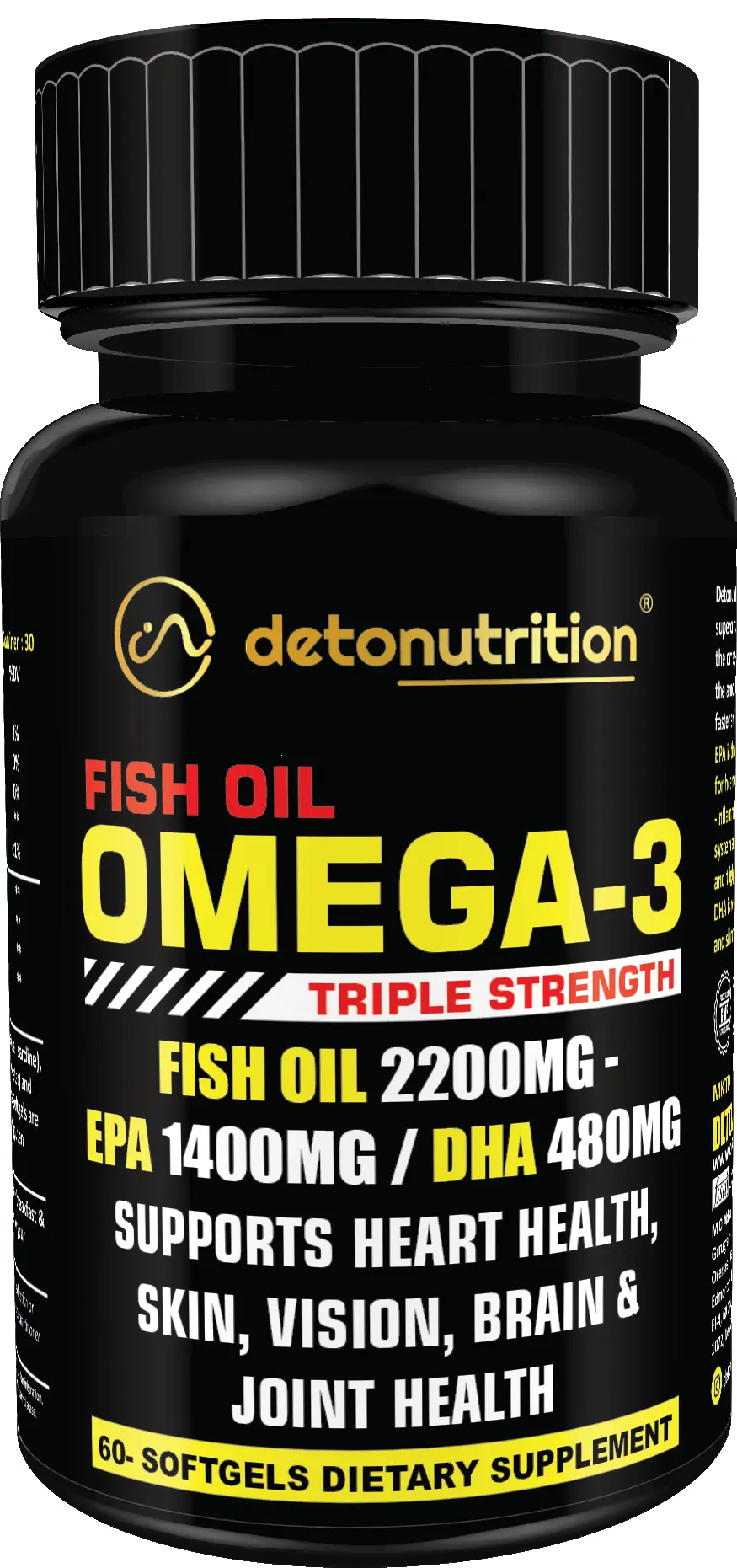How Can I Make My Liver Healthy Again?
Your liver is one of the most important organs in the body. It filters toxins from your blood, aids in digestion, and stores essential nutrients. However, with our modern lifestyles, it's easy to put our livers under strain. The good news is that the liver has a remarkable ability to heal itself – if you give it the right support. So, if you are searching “How Can I Make My Liver Healthy Again” then Read on this blog to know the best ways to make your liver happy and healthy again.
Read This Article - 4 Warning Signs Of A Damaged Liver And How To Treat It?
Here's How You Can Make Your Liver Healthy Again
1. Stay Hydrated
Staying hydrated supports liver health by aiding in the detoxification process. Sufficient water intake helps flush out toxins, including those processed by the liver, promoting optimal liver function. Dehydration can hinder liver performance, leading to a buildup of toxins and potential damage. Hydration also assists in maintaining blood volume and circulation, crucial for nutrient delivery to the liver cells. Additionally, adequate hydration helps prevent the formation of gallstones, a common liver-related issue. Making hydration a priority, alongside a balanced diet and lifestyle, contributes to overall liver health and ensures its efficient functioning in detoxification and metabolic processes.
2. Eat a Liver-Loving Diet
- Whole Grains: Choose whole grain bread, brown rice, and quinoa for fiber and B vitamins.
- Leafy Greens: Spinach, and kale are packed with antioxidants that support liver health.
- Cruciferous Veggies: Broccoli, cauliflower, and sprouts contain compounds that aid in liver detox.
- Berries Blueberries, raspberries, and strawberries are rich in antioxidants.
- Fatty Fish: Fatty fish like salmon and sardines provide omega-3s, which reduce inflammation.
- Nuts and Seeds: Almonds, walnuts, chia seeds, and flax seeds are high in healthy fats and antioxidants.
- Olive Oil: Use this healthy fat for cooking instead of processed oils.
Note: Limit Processed and Packaged Foods
Try to avoid or minimize cookies, candy, processed meats, fries, fried chicken, doughnuts and soda as these foods put a strain on your liver and cause inflammation.
3. Watch Your Weight
Being overweight or obese puts you at risk for fatty liver disease. If you need to lose weight, aim for 1-2 pounds per week for a healthy weight loss. Excessive weight can severely impact liver health by promoting the accumulation of fat in the liver cells, leading to a condition known as non-alcoholic fatty liver disease (NAFLD). This excess fat can cause inflammation and scarring of the liver, progressing to non-alcoholic steatohepatitis (NASH) and eventually to cirrhosis or liver failure. Moreover, obesity is closely linked with insulin resistance and metabolic syndrome, further exacerbating liver damage. Lifestyle modifications, including weight loss through diet and exercise, are crucial in managing and preventing these conditions, safeguarding liver function and overall health.
4. Quit Alcohol
Alcohol is a major strain on your liver. If you drink, try to quit this habit. Quitting alcohol can significantly improve liver health and even reverse some damage. The liver has remarkable regenerative abilities, and abstaining from alcohol allows it to heal. Alcohol cessation reduces inflammation, fat accumulation, and fibrosis, preventing further harm and promoting liver function restoration. However, the extent of recovery depends on factors like the duration and severity of alcohol consumption, as well as individual health. Adopting a healthy lifestyle with a balanced diet and regular exercise further supports liver health. Consulting a healthcare professional is advisable for personalized guidance and monitoring during the recovery process.
5. Don't Smoke
Smoking damages your liver and makes it harder for it to heal. Quitting smoking is one of the best things you can do for your health. Not smoking benefits liver health by reducing the risk of liver disease and improving its function. Smoking increases oxidative stress and inflammation in the liver, accelerating the progression of liver diseases such as fatty liver disease, hepatitis, and liver cancer. By quitting smoking, individuals lower their risk of developing these conditions and give their liver a chance to heal. Furthermore, quitting smoking improves blood circulation and oxygen delivery to liver cells, enhancing their ability to perform metabolic and detoxification functions. Not smoking, combined with a healthy lifestyle, supports liver health and reduces the burden of liver-related illnesses.
6. Get Enough Sleep
Poor sleep can lead to inflammation and slow down your liver's detox process. Aim for 7-9 hours of sleep each night. Getting enough sleep is crucial for liver health as it allows the organ to undergo necessary repair and regeneration processes. During sleep, the liver works to metabolize toxins and waste products accumulated throughout the day, promoting detoxification. Sufficient sleep also helps regulate hormones involved in metabolism, such as insulin and cortisol, reducing the risk of insulin resistance and fatty liver disease. Chronic sleep deprivation can disrupt these processes, leading to liver dysfunction and increased susceptibility to liver-related conditions. Prioritizing adequate sleep supports overall liver health, contributing to optimal metabolic function and disease prevention.
Read This Article - How To Fix Fatty Liver Disease Types Symptoms Causes And Prevention
7. Exercise Regularly
Regular exercise improves your overall health and helps your liver function better. Aim for at least 150 minutes of moderate exercise or 75 minutes of vigorous exercise per week. Incorporating regular exercise into your routine, alongside a balanced diet and other healthy habits, can contribute to the overall health and function of your liver.
Regular exercise helps in several ways
- Weight management: Regular exercise aids in weight loss or weight maintenance, reducing the accumulation of fat in the liver and lowering the risk of fatty liver disease.
- Improved insulin sensitivity: Exercise helps the body use insulin more effectively, reducing the risk of insulin resistance and type 2 diabetes, both of which are linked to liver health issues.
- Enhanced blood circulation: Physical activity promotes better blood flow, delivering oxygen and nutrients to liver cells, which aids in their function and regeneration.
- Reduction of inflammation: Exercise has anti-inflammatory effects, which can help reduce liver inflammation and the progression of liver diseases.
8. Manage Stress
Chronic stress can lead to inflammation and slow down liver detox. Try stress-reducing techniques like meditation, deep breathing, or yoga. Managing stress can positively impact liver health by reducing the body's overall burden of inflammation and promoting healthier lifestyle habits. Chronic stress can contribute to liver problems by increasing inflammation, disrupting hormone balance, and promoting unhealthy behaviors such as overeating or excessive alcohol consumption, which can harm the liver.
Effective stress management techniques, such as mindfulness, meditation, exercise, and spending time with loved ones, can help lower stress levels and mitigate its negative effects on the liver. Additionally, reducing stress can indirectly support liver health by improving sleep quality, immune function, and overall well-being. By managing stress effectively, individuals can help protect their liver and promote overall health and longevity.
9. Get Enough Vitamins and Minerals
Certain nutrients are especially important for liver health
- Vitamin D: Spend time outdoors in sunlight, take a vitamin D supplement, or eat vitamin D-rich foods like fatty fish, egg yolks, and mushrooms.
- Vitamin B Find vitamin B in leafy greens, whole grains, and lean proteins. You can also take detovit pro capsules to get enough vitamins.
- Omega-3s: Eat fatty fish, walnuts, chia seeds, and flax seeds.
- Other Antioxidants: Berries, leafy greens, and other fruits and veggies are packed with antioxidants.
You can take omega-3 supplement, extended liver support Kit for better nutrition support.
10. Get Regular Check-Ups
Regular blood tests can check for signs of liver damage. If you have risk factors like obesity or heavy alcohol use, talk to your doctor about getting tested more often. Regular check-ups are essential for maintaining liver health because they allow for early detection and management of liver-related conditions. During check-ups, healthcare providers may perform tests such as liver function tests, imaging studies, or screenings for viral hepatitis and liver cancer. Detecting liver problems at an early stage enables prompt intervention and treatment, preventing further damage and complications. Moreover, regular check-ups provide an opportunity for healthcare professionals to assess individual risk factors, offer lifestyle recommendations, and provide support for maintaining liver health. By staying proactive with regular check-ups, individuals can monitor their liver health, address any concerns promptly, and work towards optimizing their overall well-being.
Conclusion
In conclusion, maintaining liver health requires a multifaceted approach encompassing lifestyle modifications, regular monitoring, and proactive management of risk factors. Adopting a balanced diet rich in fruits, vegetables, and whole grains while limiting processed foods, sugar, and alcohol can significantly support liver function. Regular exercise, sufficient hydration, and adequate sleep are equally crucial in promoting liver health. Furthermore, avoiding smoking, managing stress effectively, and attending regular check-ups facilitate early detection and intervention for liver-related conditions. By incorporating these strategies into daily life, individuals can take proactive steps towards ensuring optimal liver health and overall well-being.





